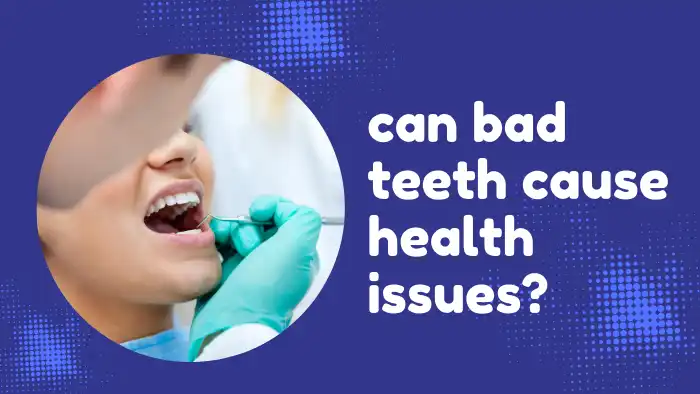Oral health greatly impacts overall well-being. Bad teeth plagued by extensive decay, infections, and poor integrity cause cosmetic concerns and dental pain and elevate risks for detrimental systemic health conditions. Bacteria, inflammation, and poor nutrition from dental problems can worsen issues affecting the heart, lungs, endocrine system, mental health, and more.
key connections between oral diseases like caries or periodontitis and the development of other issues empower properly caring for your teeth to maximize whole body health.
Beyond merely discomfort in the mouth, Empirical studies have demonstrated a robust correlation between dental caries and systemic health issues. Untreated gum disease and cavities, for example, can allow germs to enter the bloodstream and perhaps cause infections in other body areas.
Furthermore, there is a connection between a prolonged gum inflammation and a higher risk of diabetes, heart disease, and stroke. Furthermore, poor nutrition and digestive troubles may arise from an inability to chew effectively owing to oral abnormalities, aggravating general health issues.
Frequent dental examinations, brushing, and flossing can help stop oral issues before they become serious enough to affect your overall health. Oral and systemic health can also be greatly enhanced by leading a healthy lifestyle that excludes tobacco use and includes a balanced diet.
It’s critical to see a dentist as soon as you notice any dental problems in order to treat them before they worsen and might compromise your general health. Long-term health protection can be greatly enhanced by taking proactive measures to take care of your teeth and gums.
In summary, dental decay can lead to more than just discomfort in the mouth. To avoid potential systemic health issues linked to poor dental health, it is essential to practise excellent oral hygiene and seek timely dental care.
By placing a high priority on dental health as an essential component of total wellbeing, people can reduce their chance of experiencing health problems associated with dental decay and live longer, happier lives.
Heart Disease and Endocarditis Risks
Poor oral hygiene results in more plaque buildup, carbohydrate fermenting acids, and oral bacteria including Streptococcus species, a common cause of infective endocarditis when introduced into the bloodstream through bleeding gums, tooth extractions, or brushing.
Endocarditis irritation and inflammation of the heart valves or inner lining prove life-threatening, requiring intensive antibiotic treatment to clear difficult-to-eradicate biofilm infections embedded in endothelium tissues.
Likewise, chronic dental inflammation introduces bacteria into the blood circulation stimulating chronic low-grade systemic inflammation responses contributing over decades to atherosclerotic cardiovascular disease.
C-reactive protein markers remain elevated in those with recurrent dental caries or periodontal disease, suggesting poor oral health poses independent risks for heart attacks or strokes beyond other factors like cholesterol and hypertension alone according to recent studies.
Diabetes and Blood Glucose Control

Periodontal diseases adversely affect glycemic control in diabetic patients incapable of fighting infections well due to compromised immunity. Chronic inflammation releases cytokines, fatty acids, and other biological mediators into systemic circulation that reduce insulin sensitivity and hinder glycemic regulation.
Those with both diabetes and severe gum disease demonstrate worse blood glucose control compared to diabetics with healthy gums. Treating oral inflammation and infection is vital for proper long-term diabetic care and stabilization.
Respiratory Diseases and Pneumonia
Oral bacteria aspiration into the airways and lungs occurs frequently in those with poor oral hygiene and health.
Inhaling plaque bacteria increases risks for pneumonia, COPD exacerbations, and reduced pulmonary function. Hospitalized, elderly, and immunocompromised patients especially benefit from diligent oral decontamination practices lowering their chances of developing pneumonia while healing.
Preterm Birth and Developmental Issues
Maternal periodontal diseases during pregnancy elevate risks for preterm births and low birth weights due to the dissemination of oral bacteria and inflammatory mediators into the placenta and amniotic fluid. Infection also triggers increased uterine contractions.
Newborns may further acquire cavity-causing bacteria at birth from mothers with high oral loads. Promoting good oral health practices during pregnancy proves vital in minimizing early childhood caries and growth impediments.
Nutritional Deficiencies
Broken, infected, or missing teeth hinder proper chewing, swallowing, and digestion of foods. Poor or painful dental status often deters intake of crunchy fruits and vegetables. Nutritional limitations during childhood dental decay may deprive proper intake of protein, iron, and other vitamins essential for growth and cognitive functioning. Malnourishment from dental limitations usually reverses once proper tooth repairs, extractions, or dentures are received.
Conclusion
Given the far-reaching whole-body effects of poor oral health, prioritizing prevention and prompt treatment of dental diseases improves longevity and quality of life immensely. Don’t wait for noticeable problems before proper care. Partnering with your dentist to control plaque, decay, and infection risks – even preemptively – pays dividends to protect overall health and longevity starting right from the incisor’s back.
FAQs
Can bad teeth increase dementia risks like Alzheimer’s disease?
Potentially yes. Chronic oral bacterial burdens and inflammation are hypothesized to contribute to cerebral amyloid deposition, microvascular damage, and neurofibrillary tangles disrupting cognition. While requiring more research, maintaining good oral health helps control common periodontal bacteria and inflammation associated with Alzheimer’s progression.
Do cavities and gum disease impact overall mortality risks?
Yes. Multiple studies correlate periodontitis with increased cardiovascular mortality after adjusting for other risk factors. Oral inflammation provides an independent risk marker for fatal coronary events. Controlling dental diseases reduces harmful systemic inflammatory loads improving longevity odds across populations.
Can my dentist tell if I have other health issues like diabetes based on my teeth?
Savvy dentists recognize warning signs like gum bleeding, infections, slow healing, and accelerated caries as red flags for compromised immunity issues, and refer patients for medical testing accordingly. Oral inflammation and periodontal defects often provide early first clues to undiagnosed diabetes, kidney diseases, osteoporosis and more based on characteristic dental presentation patterns.
If I brush and floss properly, am I protected from the health risks of bad teeth?
Largely yes, but even responsibly cared for teeth remain vulnerable to inevitabilities like enamel cracking from chewing forces over decades, requiring restorative care to prevent underground decay and nerve infections setting in over time. No amount of diligent hygiene today necessarily prevents all dental health issues down the road as aging brings new vulnerabilities requiring intervention.
Are dental health risks less concerning if I don’t have any pain issues?
Not. By the time overt pain, bleeding, or discomfort arises, often irreversible infections, bone loss, and systemic impacts have already taken hold. Even asymptomatic mouths still harbor millions of bacteria that gain entry through microscopic defects. Only dental exams testing for early signs of trouble not felt, like with heart disease, reliably indicate true risk factors needing preemptive care.

A Blogger, Author and Researcher! Gohar Aalam is recognized as a full-time blogger for Health and Tech Niches. I’m a Fountainhead of Gethealthup.com, will provides high quality knowledge.








